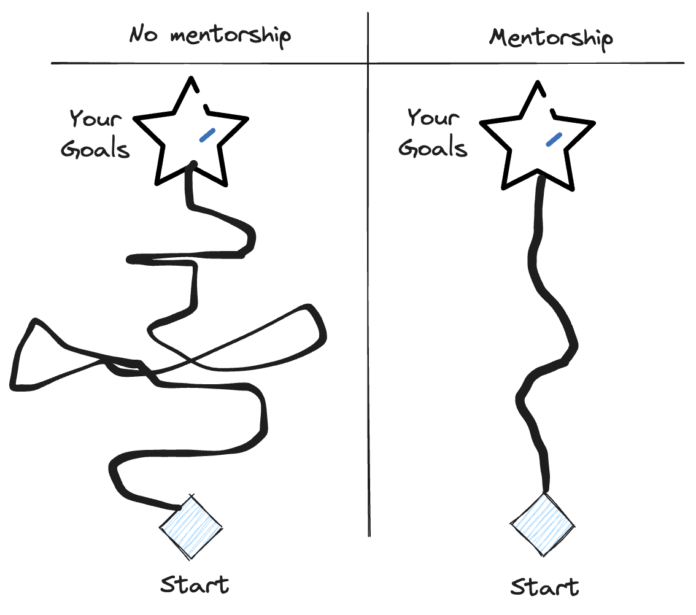But what would happen to your development if you were unable to acquire the specific guidance you required at that time? The good news is that you can finally step into the role of mentor or educator that you wished someone else would play for you when you were younger.
The Value of a Trustworthy Guide or Mentor
Mentoring is a cooperative process in which an experienced person (the mentor) helps a less experienced person (the mentee) by sharing their knowledge, wisdom, and competence to help the mentee succeed in achieving their goals and reaching their full potential. There are several positive outcomes from the mentor-mentee connection.
You may be the kind of life-changing impact on another person that you wished you could find when you were in need of direction yourself by becoming a mentor.
Understanding one’s strengths and areas of expertise requires introspection.
The first step in developing into a mentor is taking stock of your own skills, expertise, and strengths. These interactions will serve as the foundation for your future mentoring position.
Creating Measurable Goals
To be a good mentor, you must first fully understand the goals and aspirations of the individual you will be guiding. Because of this, you’ll be able to better tailor your mentorship to their specific requirements.
Empathy and the ability to actively listen are essential.
Listen carefully to the thoughts, concerns, and questions your mentee raises. Make sure they have somewhere they can go where they won’t be criticized and can feel comfortable being themselves. Empathy is crucial to the growth of trust and rapport between a mentor and mentee.
To Share Some of Your Knowledge
Your mentee will seek to you for guidance because they respect you as an authority figure. Tell the truth about your successes and failures, since you can learn from both. Your role is to function as a guide and to make learning as simple as possible, so keep in mind that it’s acceptable not to know everything.
Constructive feedback provision
Exchange of critical feedback is essential to the mentoring process. Provide your mentee with feedback that is both useful and constructive, focusing on specific ways in which they might grow. Motivate them to see setbacks as challenges they can overcome to become better people.
Instilling a Sense of Independence
Even though mentoring entails helping someone out, it’s important to encourage your mentee’s feeling of independence. The end goal is for them to have the competence, experience, and independence to make sound choices without external influence.
Giving People What They Need to Grow and Thrive (Food and Shelter)
Someone who is truly invested in the success of their mentee is an excellent mentor. Inspire and encourage them to make the most of their time together as they travel.
Ability to Adapt
Always adapt your mentoring style to the specific needs of the students you’re working with. A good mentor should be able to change with the times.
Controlling the Clock
It is crucial that you find a method to combine mentoring others with your own personal and professional life. Set clear limits and allot certain amounts of time for mentoring activities. It’s crucial to keep up a regular schedule of availability and commitment.
Growth as an Individual
Mentoring involves interaction on both ends. In the same manner that you guide the development of the individual you are mentoring, look for ways to grow as a mentor and enhance your own skills.
The Importance of a Role Model in Your Life
If you take the initiative to become the mentor you always wanted, you’ll find that the benefits to both you and your mentee are substantial. Here are just a few of the advantages:
It’s possible that witnessing the mentee’s growth and improvement would give you with a deep feeling of satisfaction and pride.
Enhanced Potential as a Leader The leadership and communication abilities you develop with a mentor may serve you well throughout your life. Mentoring connections may be quite beneficial since they often lead to good contacts that can help you advance in your career.
Having a mentor might help you gain a fresh perspective and see challenges from different angles. You may use this to think beyond the box while tackling challenges.
Within These Covers: A Comprehensive Overview of the Mentoring Program and All It Has to Offer
If you are curious in the mentoring process and the specific benefits it provides, we encourage you to read the articles we’ve posted in the “How It Works” and “Benefits of Mentorship” subheadings.
Mentorship and Its Effect on Society
Although mentoring’s major focus is on the growth of both the mentee and the mentor, the impact of the connection extends well beyond the time spent together. A culture that values mentoring and promotes it actively benefits in many ways:
Mentees have an advantage in the job market when they improve their knowledge and abilities via mentoring.
Fostering a culture of innovation requires active promotion of mentoring relationships.
transfer of Information Tacit knowledge refers to information that is difficult to document or is not often included in formal education, and mentorship is an effective technique for enabling the transmission of this type of knowledge. By sharing knowledge, the sector can keep its long-standing traditions alive.
Through the mentoring process, bonds of friendship and community are strengthened. As trusting relationships develop between mentors and mentees, communities and support systems flourish, which benefits everyone.
The cultivation of competent leaders is the goal of leadership development programs. And therefore, good leaders help organizations and governments make smarter choices and make progress.
Those mentees who get the most from their mentor connections are more likely to become involved citizens who work to improve their communities as a result of their interactions with others.
Making Conditions Ideal for Mentoring Efforts
Many different types of actors- from individuals to corporations to public schools and government agencies- make up this ecosystem. Here are several ways in which everyone may help:
Anyone can take part in a mentoring relationship, either as a mentee or a mentor. One person’s act of knowledge sharing might spark a chain reaction that benefits everyone.
Establishing internal mentoring programs is one way for businesses to express their support for the mentorship movement. These steps might boost employee development, retention, and happiness on the work.
Government-Run Organizations: Government-run organizations can promote mentoring through a variety of policies and financial incentives. Businesses and organizations that provide funds to mentoring programs may get awards, grants, or tax breaks.
The mentoring gap can be closed via the efforts of non-profit organizations that pair up mentors and mentees from disadvantaged communities and demographics. They can also aid mentoring relationships by providing education and resources.
Take on the role of mentor or instructor you’ve always wished you’d had.
Introspection; goal-setting; active listening; sharing of information; providing of feedback; encouragement of autonomy; encouragement of development; adaptability to new circumstances; time management; and personal development.
By fostering a mentorship ecosystem in your local community and place of work, you may aid in the development of a society in which mentorship is not an unusual event but rather a frequent and highly regarded practice.







